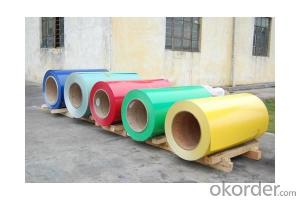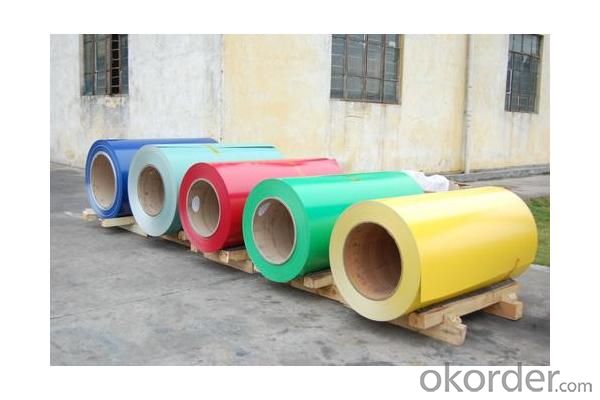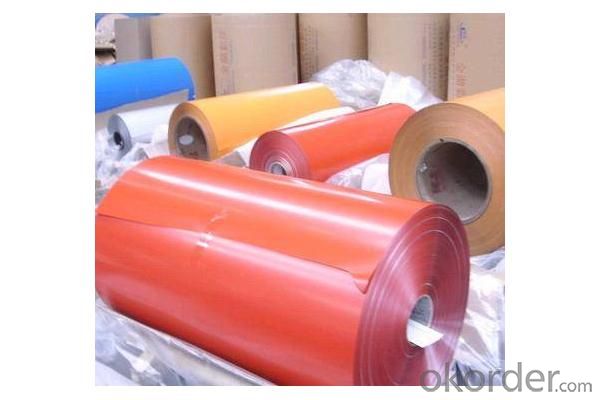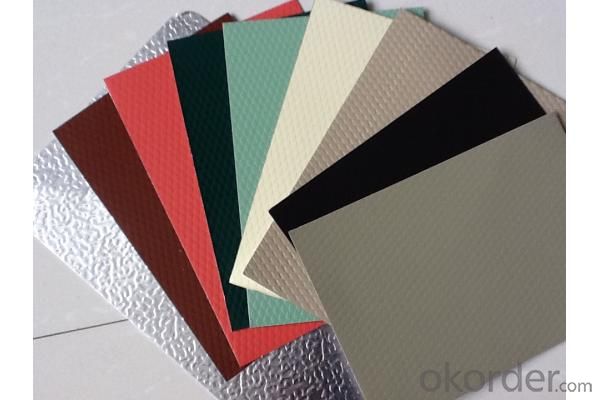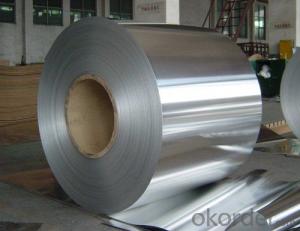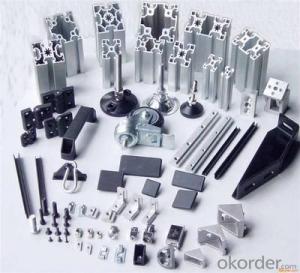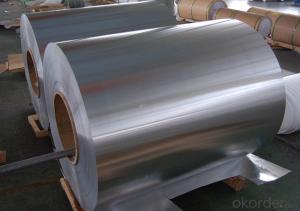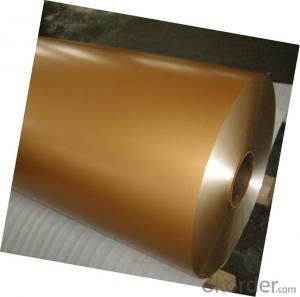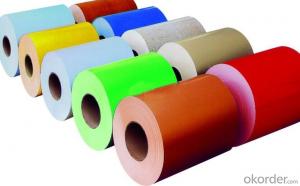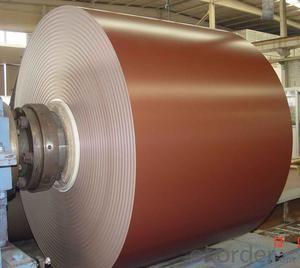Colored Aluminum Coil - Ceiling Colorful Aluminum Coils 6063 6060 6062
- Loading Port:
- Tianjin
- Payment Terms:
- TT OR LC
- Min Order Qty:
- 100 m.t
- Supply Capability:
- 10000 m.t/month
OKorder Service Pledge
OKorder Financial Service
You Might Also Like
Specification
Specification of Color Coated Aluminum Coil | |
Alloy | 1050 1060 1070 1100 1200 1235 / 3003 5052 5083 6061 6063 5005 etc. |
Alloy or not | Non-alloy / Alloy |
Temper | O, H112, T4, T5, T6, T651 etc. |
Specification | Thickness: 0.5mm - 500mm |
Width: 600mm - 2200mm | |
Length: 1000 - 6000mm or in coil size | |
Surface | coated |
Application | Heat preservation\ refrigerator\ Furniture\ decorate\ industry\ |
construction\ mould and so on | |
Features | 1.With good plasticity no matter in Cold and Hot condition; |
2. Can be pressed into various shapes of Construction Profile; | |
3. Easy to weld and cold process with good mouldability; | |
4. Can be processed into Sheet, Strip, Tube, Bar, Profile, Forged Piece, etc | |
5. Long life time. | |
MOQ | 3 Ton |
Package | wooden pallets or as customer request |
payment | 30% by T/T as deposit, and the rest 70% balance before loading. |
Delivery time | 15-30 days after receiving the deposit. |
Coating of Color Aluminum Coil
Coating thickness | PVDF >=25micron POLYESTER>=18micron |
Color standard | E < 2 or it is not obvious by eyeballing |
Pencil hardness | > 2HB |
Coating adhesive | not lower than first grade Impact: no any crack (50kg/cm, ASTMD-2794:1993) |
Bend strength | >100 times |
Boiling point: | no any distortion and color change (in the 99 more or less 1 degree water, then cooling 2 hours) |
Corrosive | surface deep in the 5% muriatic acid and 5% NaCL, |
interior deep in the 2% muriatic acid and 2% NaCL, after 48 hours, no change |
Application of Color Coated Aluminum Coil
Main Usage: Aluminium curtaim wall, Aluminium Composite Panel, Aluminium Honeycomb Plate, Ceiling,
Roof, Roller Shutter Door, Garages Door, Furniture, Electronic Industry, etc.
Our services
Main Services:
> Precision aluminum plate
> Casting products
> Forging products
Special Services:
> Alloy selection
> Aluminum machining techniques
> Hot working
> Surface treatment
Our Promise
---High quality stainless steel with reasonable price.
---Wide excellent experiences with after-sale service.
---Every process will be checked by responsible QC.
---Professional packing teams which keep every packing safely.
---Trial order can be done in one week.
---Samples can be provided as your requirements.
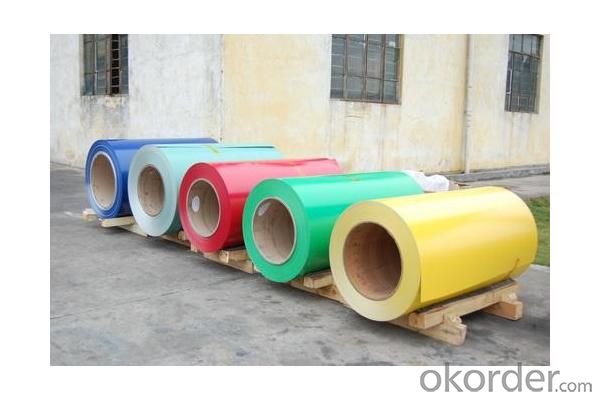
- Q: Are aluminum coils suitable for architectural applications?
- Aluminum coils are indeed suitable for architectural purposes. The construction industry often relies on aluminum, a highly adaptable and long-lasting material, for a variety of architectural projects. The use of aluminum coils offers numerous benefits in this field, including their light weight, resistance to corrosion, and ease of shaping into desired forms and sizes. These coils find application in roofing, cladding, facades, gutters, and more architectural areas. Moreover, architects and designers have the option to coat aluminum coils with different finishes, providing a wide array of aesthetic possibilities. In conclusion, choosing aluminum coils for architectural projects is an excellent decision due to their robustness, endurance, and flexibility.
- Q: How are aluminum coils used in the production of electrical conductors?
- Aluminum coils are used in the production of electrical conductors as they provide a lightweight and cost-effective alternative to copper coils. The coils are typically wound around a core to create a magnetic field when electricity passes through them, allowing for the efficient transmission of electrical energy. Aluminum's high conductivity and low resistance make it an ideal choice for manufacturing electrical conductors, resulting in improved energy efficiency and reduced production costs.
- Q: How do aluminum coils contribute to energy efficiency?
- Aluminum coils contribute to energy efficiency by improving the heat transfer efficiency in various applications. The high thermal conductivity of aluminum allows for better heat exchange, resulting in reduced energy consumption and increased overall efficiency of cooling and heating systems. Additionally, aluminum coils are lightweight and durable, making them more efficient to manufacture, transport, and install, thus reducing energy requirements throughout their lifecycle.
- Q: Are there any special considerations for handling and storing aluminum coil scraps?
- Yes, there are specific considerations for handling and storing aluminum coil scraps. Firstly, it is important to handle aluminum coil scraps with care to avoid any injuries. These scraps can have sharp edges, so workers should wear appropriate protective gear, such as gloves and safety glasses, when handling them. When storing aluminum coil scraps, it is crucial to keep them in a dry and well-ventilated area. Moisture can cause the aluminum to corrode, leading to degradation of the material. Storing the scraps in a covered area or using moisture-absorbing materials can help prevent this. Additionally, it is essential to segregate aluminum coil scraps from other materials, especially those that can cause a chemical reaction or contamination. This is particularly important if the aluminum coil scraps are coated or treated with other substances. Furthermore, it is advisable to stack and store the aluminum coil scraps properly to prevent any damage or accidents. Stacking them in a stable manner, using appropriate equipment such as pallets or racking systems, can reduce the risk of collapse or shifting. Lastly, it is important to follow local regulations and guidelines for handling and storing aluminum coil scraps. These regulations may vary depending on the location and industry, so it is essential to stay informed and comply with any specific requirements. By following these considerations, companies can ensure the safe handling, storage, and preservation of aluminum coil scraps, minimizing the risk of accidents, damage, and deterioration.
- Q: How are aluminum coils packaged for transportation?
- Aluminum coils are typically packaged for transportation by first being tightly wound and then securely strapped with steel bands. They are often placed on pallets and covered with protective materials such as plastic or cardboard to prevent damage during transit. Additionally, the coils may be loaded into containers or onto flatbed trucks, ensuring proper handling and stability throughout the transportation process.
- Q: What are the different surface protection options available for aluminum coils?
- Depending on the specific requirements and applications, there are several options available for surface protection on aluminum coils. 1. Applying a paint coating is a common method of surface protection. This creates a protective layer that helps prevent corrosion, oxidation, and damage from environmental factors. Paint coatings also provide aesthetic appeal and come in various colors and finishes. 2. Anodizing is an electrochemical process that creates a durable and corrosion-resistant oxide layer on the aluminum coil's surface. This method enhances the coil's resistance to wear and tear and provides a decorative appearance. Anodized coatings can be clear or colored, offering design flexibility. 3. Another option is applying a protective film made of plastic or vinyl on the surface of the aluminum coil. This film provides temporary protection during transportation, handling, and installation, guarding against scratches and abrasions before being removed. 4. Powder coating involves the electrostatic application of a dry powder onto the aluminum coil's surface. The powder is then cured under heat, resulting in a durable and resilient protective layer. Powder coatings are known for their excellent resistance to chemicals, UV rays, and physical impacts. 5. Cladding, or laminating, involves bonding a protective layer, such as PVC, onto the aluminum coil's surface. This method enhances resistance against scratches, impact, and weathering. Cladding can also provide additional benefits like thermal insulation and noise reduction. When selecting the most suitable surface protection option for aluminum coils, it is important to consider factors such as the intended use, environmental conditions, desired aesthetics, cost, durability, and application requirements.
- Q: Are there any recycling programs for used aluminum coils?
- Indeed, recycling programs for used aluminum coils are readily accessible. Aluminum, being highly recyclable, can be melted down and repurposed without compromising its quality. Numerous recycling centers and scrap metal yards willingly accept aluminum coils for recycling purposes. Furthermore, certain HVAC companies, which frequently employ aluminum coils in air conditioning systems, have implemented their own recycling initiatives. It is advisable to consult your local recycling center or HVAC companies to obtain information regarding the specific recycling programs available for used aluminum coils in your vicinity.
- Q: How much is one ton of aluminum coil?
- The price of aluminum sheet is calculated according to the price of aluminum ingot + processing fee (aluminum plate state), and the specific price is also different according to the size and size of aluminum sheet.If you have any questions, please ask. I hope to help you.
- Q: Are aluminum coils suitable for signage and advertising applications?
- Yes, aluminum coils are suitable for signage and advertising applications. Aluminum is a durable and lightweight material, making it ideal for outdoor signage as it can withstand various weather conditions. It also offers a sleek and professional appearance, allowing for high-quality graphics and branding to be displayed. Additionally, aluminum is highly customizable, easy to work with, and has good resistance to corrosion, making it a popular choice for signage and advertising purposes.
- Q: What are the fire-resistant properties of aluminum coils?
- Due to its inherent characteristics as a metal, aluminum exhibits excellent fire-resistant qualities when formed into coils. With a melting point of 660 degrees Celsius (1220 degrees Fahrenheit), aluminum can endure high temperatures without melting, thereby making aluminum coils resistant to fire hazards. Furthermore, unlike certain other metals, aluminum does not produce flammable gases when exposed to fire. This non-combustible attribute prevents the fire from spreading and minimizes the potential for fire-related damages. Additionally, due to its low thermal conductivity, aluminum does not efficiently conduct heat. Consequently, aluminum coils do not facilitate the transfer of heat from one area to another, which aids in containing and controlling the fire's spread. Moreover, aluminum coils frequently undergo a protective coating process to enhance their fire resistance. These coatings, composed of materials like polyvinylidene fluoride (PVDF) or polyester, create an additional barrier against fire and heat. Engineered to withstand extreme temperatures while maintaining their integrity, these coatings further bolster the fire-resistant qualities of aluminum coils. In summary, aluminum coils possess exceptional fire-resistant characteristics owing to their high melting point, non-combustible nature, low thermal conductivity, and protective coatings. These attributes make aluminum coils a dependable choice for applications where fire safety is paramount, such as in building construction, electrical wiring, and transportation industries.
Send your message to us
Colored Aluminum Coil - Ceiling Colorful Aluminum Coils 6063 6060 6062
- Loading Port:
- Tianjin
- Payment Terms:
- TT OR LC
- Min Order Qty:
- 100 m.t
- Supply Capability:
- 10000 m.t/month
OKorder Service Pledge
OKorder Financial Service
Similar products
Hot products
Hot Searches
Related keywords
